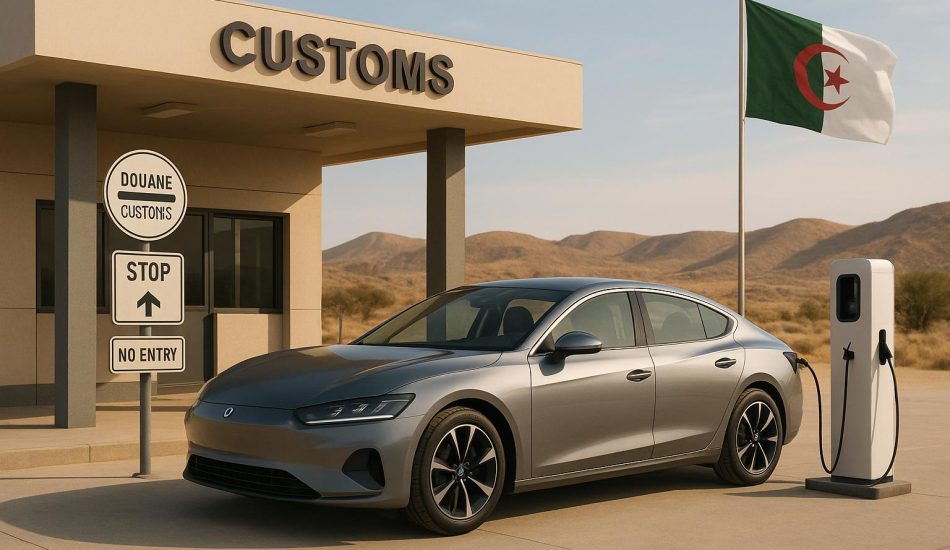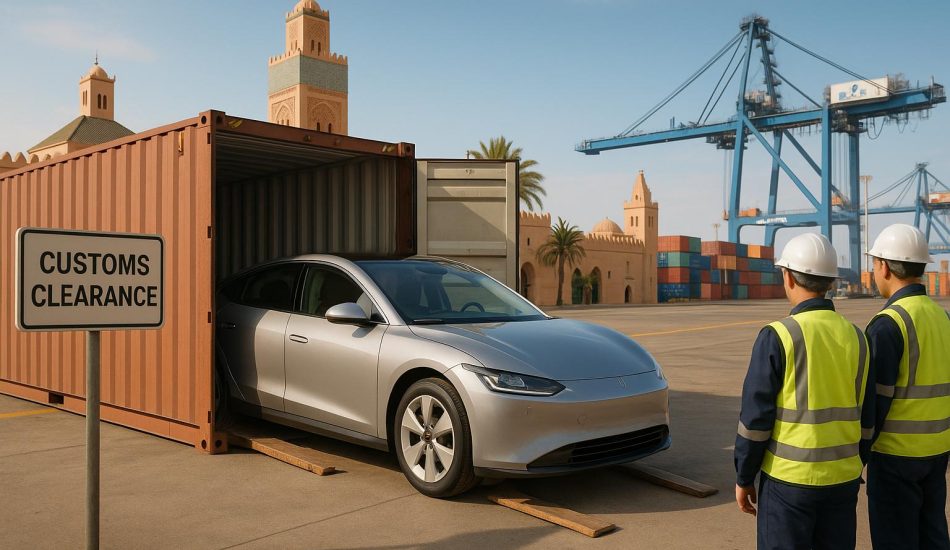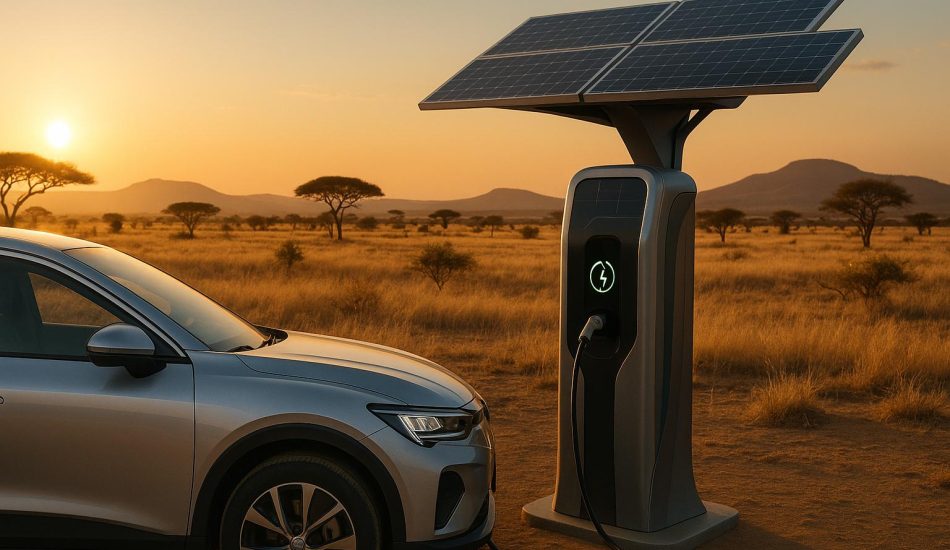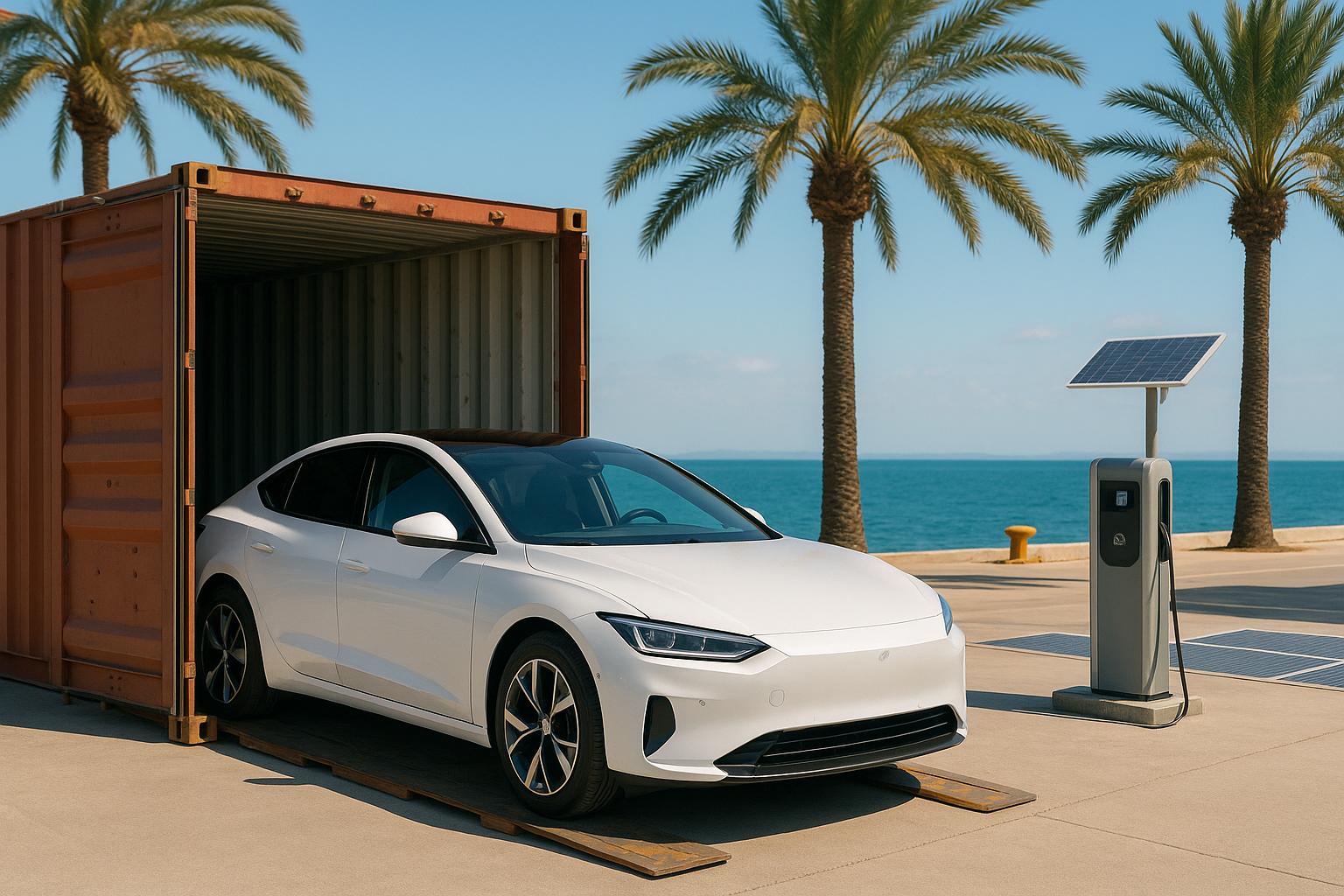
Want to import an electric vehicle (EV) to Tunisia in 2025? Here’s what you need to know:
- Tax Breaks: EVs are fully exempt from VAT and customs duties, saving you significant costs compared to traditional vehicles, which face taxes up to 360%.
- Simplified Process: New regulations streamline customs clearance, with specific quotas for EVs and reduced bureaucracy.
- Key Steps: Choose a compliant EV, prepare shipping documents (e.g., battery safety certifications), and navigate customs with required paperwork like invoices and ownership certificates.
- Incentives: A TND 10,000 (~$3,200) bonus is offered to EV buyers, alongside reduced registration fees and road taxes.
- Charging Infrastructure: Ensure your EV is compatible with Tunisia’s growing charging network, as gas stations will soon offer charging options.
Platforms like EV24.africa can help manage the entire process, from car selection to customs clearance and registration, making it easier to import EVs under Tunisia’s updated rules.
Tunisia introduces tax cuts, incentives to increase adoption of electric vehicles
Step-by-Step Guide to Importing an EV into Tunisia
Bringing an electric vehicle (EV) into Tunisia involves a structured process, requiring attention to regulations and proper documentation. Here’s a breakdown of the key steps, from picking the right car to finalizing its registration.
Choosing the Right Electric Vehicle
Start by selecting an EV that aligns with Tunisia’s import rules. Vehicles older than 10 years come with added fees, so opting for a newer model can save you money. It’s best to confirm the specifics with the Tunisia Revenue Authority.
Make sure the vehicle’s paperwork is complete, covering details like propulsion type, battery specifications, and safety certifications. The vehicle identification number (VIN) must be clearly accessible – it’ll be needed during various stages of the process. Also, check that the EV is compatible with Tunisia’s charging infrastructure to avoid headaches later on.
Once you’ve chosen your EV, prepare it for shipment by completing essential pre-shipment tasks.
Pre-Shipment Preparations
Before shipping, inspect the battery to ensure it’s intact and free from leaks – this can prevent delays. Properly label the vehicle, displaying the VIN and clearly marking it as an electric vehicle, so customs officials can identify it quickly.
Adhere to International Maritime Organization (IMO) rules for transporting lithium-ion batteries. Gather all necessary documents, including the Material Safety Data Sheet (MSDS) for the battery. Notify both your shipping company and Tunisian Customs about your plan to import the EV.
Navigating Customs Procedures
Once your EV arrives in Tunisia, it enters the customs clearance phase. This process typically takes 11–12 weeks. To get started, you’ll need to submit an import file containing specific documents, which are required to secure a visa from the relevant public service – a new step introduced in October 2022 under Tunisia’s updated control system.
The import file should include the purchase invoice, ownership certificate, shipping documents, and the battery’s MSDS. Authorities may also request additional information or even product samples to confirm the quality and safety of the imported EV.
One major benefit of importing an EV into Tunisia is the tax relief. EVs are exempt from VAT and customs duties. For comparison, gasoline vehicles are taxed up to 277%, and diesel vehicles face taxes as high as 360%. If the process feels overwhelming, hiring an experienced Importer of Record can help streamline things.
Final Steps After Import
Once customs clearance is complete, there are a few more steps to finalize the process. Register the vehicle with local authorities, pay road taxes and registration fees, and confirm that the EV is compatible with Tunisia’s charging network. Additionally, secure insurance for the vehicle, which will require your customs clearance documents, proof of ownership, and vehicle identification papers.
Finally, schedule any required technical inspections to ensure the EV meets local standards. Keep all your import-related paperwork handy, as inspectors may need to verify details against the original documents.
Costs, Taxes, and Incentives for EV Importers
Once you’ve navigated the import process, it’s time to dive into the financial details. Understanding the costs involved in bringing an electric vehicle (EV) into Tunisia is crucial for planning your budget. Thanks to updated regulations, Tunisia offers substantial tax breaks for EVs, making them a far more affordable option compared to traditional gasoline or diesel vehicles. Here’s a closer look at the key expenses and incentives that make EV imports appealing.
Import Taxes and Fees
Under the 2024 Finance Law, EVs enjoy a reduced VAT rate of 7%, a significant drop from the standard 19% applied to most imported goods. Additionally, EV owners benefit from a 50% reduction in both registration fees and annual road taxes.
On top of the VAT reduction, there’s a customs formality fee of 3%, calculated based on the total duties paid during the import process. It’s worth noting that Tunisia determines VAT by factoring in the EV’s base price along with any import duties, surcharges, and consumption taxes.
Additional Expenses to Keep in Mind
While the tax breaks are appealing, don’t forget to account for other costs like shipping fees and the charges for hiring an approved customs agent to handle the import process.
Government Incentives for EV Importers
To encourage the adoption of electric vehicles, the Tunisian government has rolled out several financial incentives. These include exemptions from internal taxes and phased reductions in import duties for traditional, hybrid, and electric vehicles.
One standout incentive is a TND 10,000 bonus (about $3,200) offered to consumers transitioning to EVs. This bonus, combined with tax exemptions and reduced fees, significantly offsets the costs tied to shipping, customs clearance, and registration. All of these measures make Tunisia an increasingly attractive destination for EV imports.
Compliance and Safety Requirements
After clearing customs, it’s crucial to ensure your EV aligns with Tunisia’s technical and safety standards. This step is key to successfully integrating your vehicle into the country’s growing electric mobility ecosystem.
Battery and Vehicle Safety Standards
Tunisia adheres to the 1958 Agreement framework, which includes UN Regulation R100. This regulation addresses essential safety aspects for electric powertrain vehicles. To gain import approval, your EV must meet rigorous safety and quality benchmarks. These are verified through certificates such as ISO compliance, conformity assessments, analysis reports, and a free sale certificate from the exporting country. Tunisian customs officials might also request additional documentation or inspect product samples to confirm compliance. Partnering with an Importer of Record (IOR) can simplify the process and ensure all technical requirements are met.
Charging Infrastructure and Compatibility
Ensuring your EV is compatible with Tunisia’s charging infrastructure is just as important as meeting safety standards. The country is actively expanding its network of EV chargers while establishing technical standards to accommodate imported vehicles. Under revised regulations, gas stations will soon be allowed to install EV chargers, and the government is collaborating with industry stakeholders to finalize guidelines for operating charging stations.
The Ministry is also working to update the NT120 standard, which will include detailed technical specifications for EV charging systems. These efforts aim to create a cohesive framework for charging infrastructure, ensuring imported EVs integrate seamlessly with the evolving system.
"EV charging prices will be deregulated, meaning the government will not impose fixed rates."
- Fethi Hanchi, Director-General of the National Agency for Energy Management (ANME)
National Electric Mobility Strategy
These technical and safety standards are part of Tunisia’s broader strategy to promote electric mobility. The Department of Industry is actively developing a national electric mobility strategy that influences import policies and incentives. This initiative acknowledges that the transport sector accounts for nearly one-third of the country’s energy consumption and over half of its petroleum product use.
To encourage EV adoption, the government has removed import quotas for EVs and reclassified EV battery charging as a "service", which will impact both regulations and pricing. Surveys show that 20% of Tunisians are interested in purchasing an EV in the near future, highlighting the growing market potential. For importers, staying informed about these regulatory changes and participating in public consultations can help shape practical policies that benefit both businesses and consumers.
sbb-itb-99e19e3
Using EV24.africa to Import EVs into Tunisia
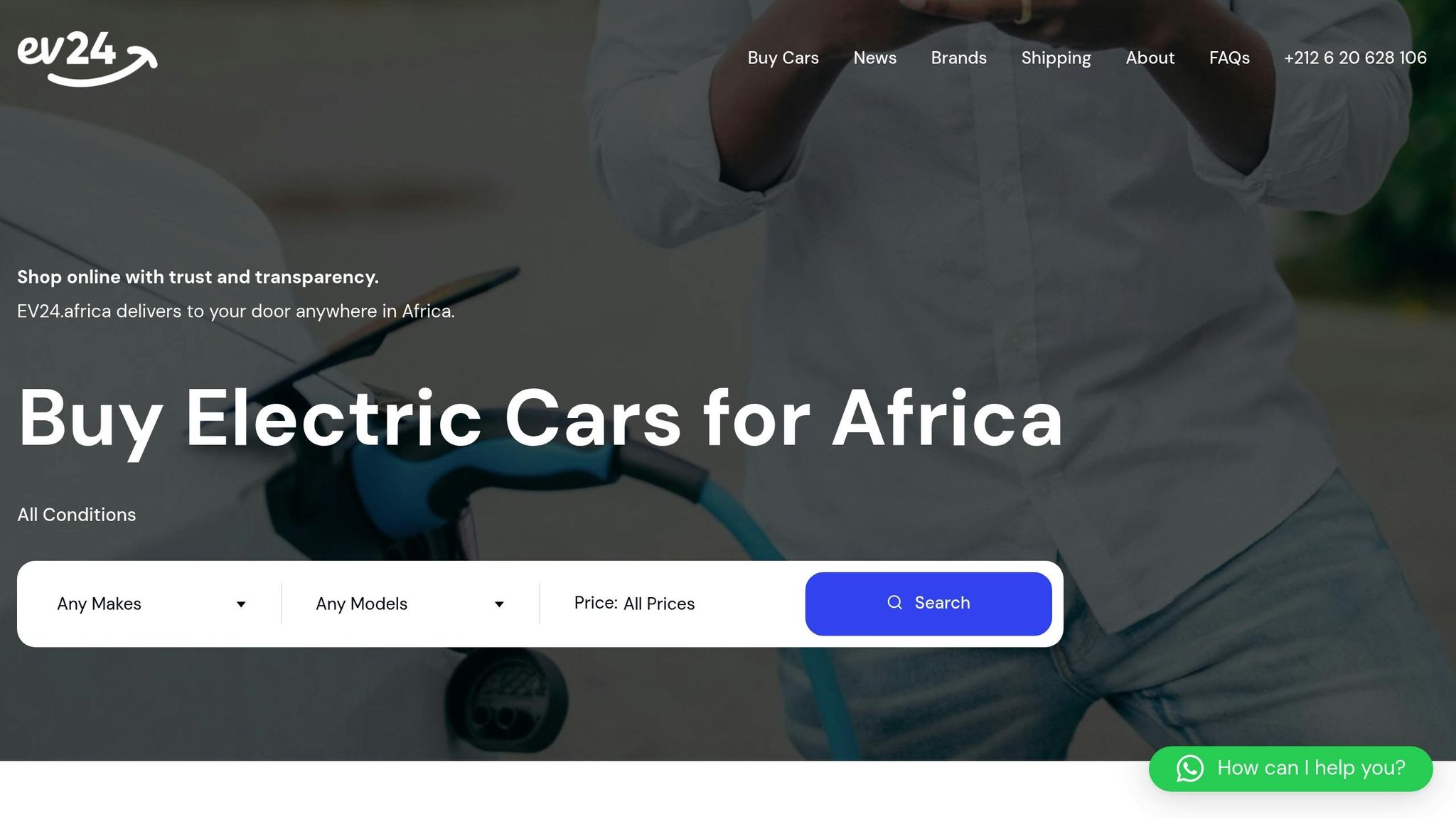
With Tunisia’s 2025 regulations on the horizon, EV24.africa is stepping up as a go-to platform for importing electric vehicles into Tunisia and other parts of Africa. From selecting a car to final delivery, the platform provides comprehensive support, ensuring a smooth import experience that aligns with the new rules.
EV Listings and Brand Selection
EV24.africa boasts an extensive catalog of electric vehicles from top manufacturers. Whether you’re eyeing a Tesla, BYD, Volkswagen, XPeng, Leapmotor, Changan, Wuling, Mercedes-Benz, Citroën, or Peugeot, the platform offers models that meet Tunisia’s 2025 standards. This variety gives buyers the flexibility to choose vehicles that fit both their budgets and the country’s technical requirements.
Each vehicle listing includes detailed specifications, transparent pricing in USD, and all relevant details. This clarity allows buyers to fully understand the financial aspects of their purchase before committing to an import.
Import Support Services
The platform takes care of the entire import process, adhering to Incoterms. Beyond the sale of vehicles, EV24.africa provides services like customs clearance, registration assistance, and tax guidance to ensure compliance with local regulations. These services address both the technical and administrative hurdles that can make importing a daunting task.
Additionally, the platform offers precise advice on duties, tax exemptions, and incentives. For instance, Tunisia’s policy of a 100% exemption on VAT and customs duties for electric vehicles is a significant financial benefit, and EV24.africa helps clients navigate these opportunities with ease.
"Africa is ready for electric vehicles, and EV24.africa is committed to making this transition smooth and accessible. Our goal is to provide a reliable, transparent, and competitive marketplace for EV buyers across the continent." – Axel Peyriere, Co-Founder and CEO of AUTO24.africa
Platform Tools and Expert Support
EV24.africa goes beyond basic services to ensure a seamless transition to electric mobility in Tunisia. By leveraging local expertise and collaborating with trusted logistics partners, the platform simplifies the import process. This network proves especially helpful in meeting Tunisia’s specific regulatory requirements and staying compliant with the country’s evolving framework for electric vehicles.
The platform’s expert support team is well-equipped to guide buyers through the intricacies of Tunisia’s 2025 import rules. They assist with documentation, safety certifications, and technical standards, making the process far less intimidating.
Key Takeaways for Importing EVs into Tunisia
Tunisia’s 2025 import policies present an exciting opportunity for electric vehicle (EV) enthusiasts, as the government offers a 100% exemption from VAT and customs duties on fully electric vehicles. This incentive simplifies the import process and makes it more financially appealing.
To successfully import EVs, it’s essential to obtain the proper import licenses for automobiles and ensure compliance with Tunisia’s technical and quality standards. Working with an Importer of Record (IOR) can help you navigate customs and secure the required permits. Beyond the import licenses, most goods don’t require additional documentation.
Be prepared for additional costs like charging infrastructure. For instance, installing a 22-kilowatt charging station costs approximately 20,000 dinars, while a 100-kilowatt station can reach 400,000 dinars. Public EVs in Tunisia typically cost around 75,000 dinars. Financial planning is also critical, as Tunisian banking regulations require foreign currency to be released only upon presenting shipment documents. U.S. exporters often prefer confirmed, irrevocable letters of credit for transactions.
This is a strategic moment for EV imports, as Tunisia’s government is actively supporting the sector through infrastructure development and ambitious goals for the future.
Platforms like EV24.africa simplify the process by offering services such as customs clearance, registration assistance, and tax guidance. They also provide transparent pricing, real-time tracking, and access to a network of logistics partners, customs agents, and port authorities, ensuring a smooth import experience.
Success in importing EVs into Tunisia hinges on understanding the regulations, taking advantage of available incentives, and collaborating with seasoned professionals who can manage the complexities of international trade and local compliance.
FAQs
What documents do I need to import an electric vehicle into Tunisia under the 2025 regulations?
To bring an electric vehicle into Tunisia under the 2025 regulations, you’ll need to gather the following paperwork:
- Original shipping bill of lading
- Completed Tunisia Customs Form C
- Certificate of free sale issued by the authorized agency in the exporting country (if required)
Double-check that all documents are correct and current to prevent any delays or issues during the customs process.
What should I know about Tunisia’s charging infrastructure and ensuring my imported EV is compatible?
Tunisia is ramping up its electric vehicle (EV) charging network at an impressive pace. The country is on track to expand from 500 charging stations in 2025 to a projected 5,000 by 2030. Both fast and standard chargers are being installed, with private investments playing a key role in this growth. To encourage adoption, the government is also loosening regulations on charging prices, which will now vary depending on the station’s capacity and type.
If you’re considering importing an EV, it’s crucial to confirm that your vehicle’s charging port is compatible with Tunisia’s standard connectors. Fast chargers are perfect for quick top-ups, while standard chargers are better suited for slower, everyday charging. As regulations continue to develop, more gas stations are expected to add EV charging points, making it increasingly convenient to find compatible options across the country.
What financial benefits can you expect when importing an electric vehicle to Tunisia in 2025?
Financial Incentives for EV Imports in Tunisia in 2025
Tunisia is stepping up its efforts to promote electric vehicle (EV) adoption by rolling out several financial perks in 2025. These include a $3,200 rebate, a reduced VAT rate of 7% (compared to the usual 19%), and a 50% cut on registration fees and annual road taxes. These incentives aim to make EV ownership more accessible by significantly reducing initial costs.
On top of that, EVs offer long-term savings that make them an appealing option. Charging an EV costs much less than refueling a traditional car, and their maintenance expenses are lower too, thanks to fewer moving parts. Combined, these advantages make importing an EV to Tunisia a smart financial move and a step toward a cleaner, greener future.


